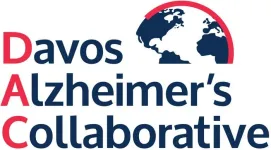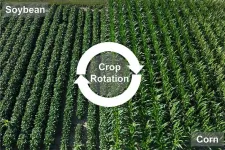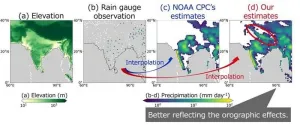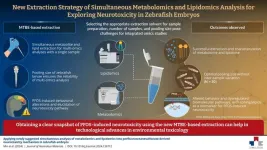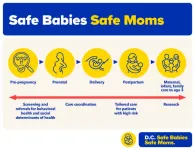(Press-News.org) The Davos Alzheimer’s Collaborative (DAC), a pioneering worldwide initiative seeking to cure Alzheimer’s disease and improve brain health, today announced the launch of its Brain Health Navigator program. The initiative led by the DAC Healthcare System Preparedness (DAC-SP) team will provide resources for patients and providers at six sites across the U.S.
Despite Alzheimer’s status as a growing worldwide epidemic, pathways for accurate diagnosis and evidence based interventions including new therapies are either underdeveloped or non-existent. Every day, over 2,000 patients in early stages of Alzheimer’s disease progress to later ones. The current system requires multiple stakeholders to coordinate in a rapid and efficient manner in order to ensure that candidates who are eligible for disease-modifying therapies receive them during the early window of opportunity when they will most benefit. Even without new therapies, the diagnostic journey for patients and health systems is slow and cumbersome resulting in families not receiving all of the care options, including clinical trial participation, that should be available to them.
To meet this challenge, DAC has developed the Brain Health Navigator program to provide resources and intuitive coordination between patients and providers along the brain-health pathway. The program will support healthcare providers across multiple settings, from frontline patient interactions to diagnosis, and will include educational components on brain health and post-diagnostic care and support.
The six pilot sites will serve as start-up incubators for the development of materials and best practices for the program’s long-term sustainability and expansion, without the need for external funding. Brain Health Navigators will be responsible for multiple clinical and public stakeholders, and their expertise connecting patients with resources at the local level will be valuable across health systems and geographies. The learnings and practical resources from the Brain Health Navigator program will be incorporated into the DAC-SP Early Detection Blueprint.
“The DAC Healthcare System Preparedness team is proud to move forward with this important initiative building on the findings of our initial early detection programs. This effort aims to develop an intuitive set of resources that make care navigation scalable at a national level in the US,” said Tim MacLeod, PhD, DAC Healthcare System Preparedness Director. “Ultimately, our research has shown that navigation support plays a crucial role in making diagnosis more accessible to patients and families by providing resources that enable necessary changes to clinical workflows, making them more feasible and adoptable in real-world care settings.”
The six sites that are part of the program are:
Dartmouth Health (New Hampshire)
Memorial Healthcare (Owosso, Michigan)
Norton Healthcare (Kentucky)
Sharp Rees-Stealy Medical Group (California)
UC Health (Ohio)
Keck Medical Center of USC, part of Keck Medicine of USC (California)
“Improving the patient pathway is not just a priority but an imperative,” said Tatsuyuki Yasuno, Chariman & CEO, Eisai Inc. “Ensuring timely diagnosis requires collaboration across healthcare systems and public-private partnerships like DAC. Collectively, we can transform the way we approach brain health by creating a more connected, patient-centric care journey.”
Eisai, Inc. is a funder of the Davos Alzheimer’s Collaborative and provided funding for this program. To learn more about the public, private, and philanthropic support that make this project and other DAC programming possible, please visit davosalzheimerscollaborative.org.
About the DAC Healthcare System Preparedness Program
The Davos Alzheimer’s Collaborative Healthcare System Preparedness (DAC-SP) Program addresses the readiness of our healthcare systems worldwide for a global aging population, with an initial focus on improving rates of early detection and the timely and accurate diagnosis of Alzheimer’s disease. DAC-SP applies implementation science methods to turn research breakthroughs into lasting improvements in clinical practice. To accelerate and scale the delivery of cutting-edge treatments and innovations globally, DAC-SP shares learnings and best practices through Learning Laboratory meetings and its Early Detection Blueprint. In collaboration with our partners around the world, DAC-SP serves as a catalyst for transformative improvement within healthcare systems.
About the Davos Alzheimer’s Collaborative
The Davos Alzheimer's Collaborative (DAC) is a pioneering worldwide initiative to cure Alzheimer’s disease and improve brain health, seeking to mirror the success of global efforts against infectious diseases such as HIV/AIDS, Covid, and Malaria. DAC is extending global research beyond its current focus
on traditional Western European ethnic populations into the highly diversified populations of the Global South, where the vast majority of those with Alzheimer’s live. By introducing lower-cost screening and diagnostic tools as well as new treatment and prevention modalities in primary care and community health settings, DAC is driving implementation of health system solutions that are appropriate for worldwide application. DAC also promotes the vital importance of brain health throughout the lifespan by addressing cardiometabolic and lifestyle factors, especially in early and mid-life. Absent effective action at scale around the world, by 2050, more than 150 million families and half a billion people will be personally impacted by dementia, creating a social, financial, economic, and global security disaster of historic proportions. DAC was launched in Davos in 2021 by the World Economic Forum and the Global CEO Initiative on Alzheimer's Disease. For more information, please visit: davosalzheimerscollaborative.org.
END
New York, NY – Jan. 15, 2025 –We are excited to welcome you to San Francisco for the ATS 2025 International Conference! Journalists will have access to leaders, as well as emerging scientists and clinicians, who are at the forefront of medical breakthroughs and clinical innovation in pulmonary, critical care and sleep medicine.
Join us beginning Sunday, May 18* through Wednesday, May 21. Register now and check out our Program at a Glance.
As always, you are welcome to contact the ATS communications and marketing director about scientific sessions and expert interviews whether you are joining us in person or from your (home) office. Registered ...
MINNEAPOLIS / ST. PAUL (01/15/2024) — A study by researchers at the University of Minnesota Twin Cities offers new insights into how alternating corn and soybean crops can help increase crop yield in a changing climate.
The research is published in the peer-reviewed scientific journal Global Change Biology.
Rising temperatures and weather extremes are threatening global food security, making it crucial to understand how sustainable practices like crop rotation can help improve agricultural yields and resilience.
The study found that the benefits to corn-soybean rotation, compared to continuous corn year after year, are extremely sensitive to ...
With the increase in climate change, global precipitation estimates have become a necessity for predicting water-related disasters like floods and droughts, as well as for managing water resources. The most accurate data that can be used for these predictions are ground rain gauge observations, but it is often challenging due to limited locations and sparse rain gauge data. To solve this problem, Assistant Professor Yuka Muto from the Center for Environmental Remote Sensing, Japan, and Professor Shunji Kotsuki of the Institute for Advanced Academic Research, Center for Environmental Remote Sensing, ...
The term “omics” refers to the study of entirety of molecular mechanisms that happen inside an organism. With the advent of omics technologies like transcriptomics, proteomics, metabolomics, and lipidomics, our understanding of molecular pathways of toxic environmental pollutants has deepened. But most environmental toxicology studies are still dependent on a single-omics analyses, leading to gaps in our understanding of integrated toxicity pathways of pollutants. Researchers from all over the world have ...
The Tomosynthesis Mammographic Imaging Screening Trial (TMIST) has reached its enrollment goal of 108,508 women, as announced today by the ECOG-ACRIN Cancer Research Group (ECOG-ACRIN). The study, funded by the National Cancer Institute (NCI), one of the National Institutes of Health, will now proceed with the completion of regularly scheduled mammograms and follow-up on all participants through 2027. Key in this follow-up is the collection of biospecimens and data that will help researchers learn how to personalize breast cancer screening for women.
Participants in TMIST were randomly ...
WASHINGTON - Women who were cared for by the MedStar Health D.C. Safe Babies Safe Moms program (SBSM) have better outcomes in pregnancy, delivery, and postpartum, according to a study published today in NEJM Catalyst Innovations in Care Delivery. Additionally, the study showed that Black patients cared for by SBSM were also less likely to have low or very low birthweight babies or preterm birth than Black or White patients who received prenatal care elsewhere.
Compared to patients who received prenatal care elsewhere, patients cared for under Safe ...
Octopus arms move with incredible dexterity, bending, twisting, and curling with nearly infinite degrees of freedom. New research from the University of Chicago revealed that the nervous system circuitry that controls arm movement in octopuses is segmented, giving these extraordinary creatures precise control across all eight arms and hundreds of suckers to explore their environment, grasp objects, and capture prey.
“If you're going to have a nervous system that's controlling such dynamic movement, that's a good way to set it up,” said Clifton Ragsdale, PhD, Professor of Neurobiology at UChicago and senior author ...
The three-dimensional shape of a protein can be used to resolve deep, ancient evolutionary relationships in the tree of life, according to a study in Nature Communications.
It is the first time researchers use data from protein shapes and combine it with data from genomic sequences to improve the reliability of evolutionary trees, a critical resource used by the scientific community for understanding the history of life, monitor the spread of pathogens or create new treatments for disease.
Crucially, the approach works even with the ...
PHILADELPHIA, PA (January 15, 2025) - Can memory influence what and how much we eat? A groundbreaking Monell Chemical Senses Center study, which links food memory to overeating, answered that question with a resounding “Yes.” Led by Monell Associate Member Guillaume de Lartigue, PhD, the research team identified, for the first time, the brain’s food-specific memory system and its direct role in overeating and diet-induced obesity.
Published in Nature Metabolism, they describe a specific population of neurons in the mouse brain that encode memories for sugar and fat, profoundly impacting food intake and body ...
Indigenous students identified inadequate funding as a major barrier to completing post-secondary education according to a new study published in AlterNative: An International Journal of Indigenous Peoples.
The study surveyed Indigenous university students at Algoma University. The students, who identified as either First Nations or Métis, reported that they required multiple sources of funding, including government student loans and personal savings, to afford their post-secondary education. About two-thirds (69%) of students received funding for their education from First Nations sources, including funding from federal programs for Indigenous students.
“This ...
